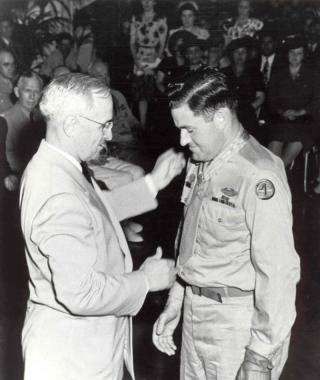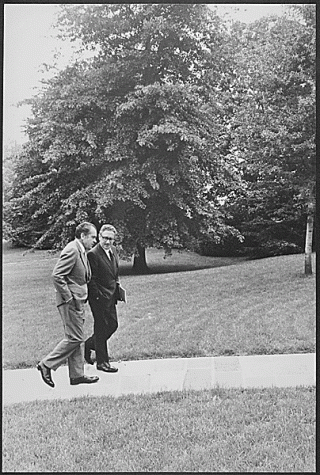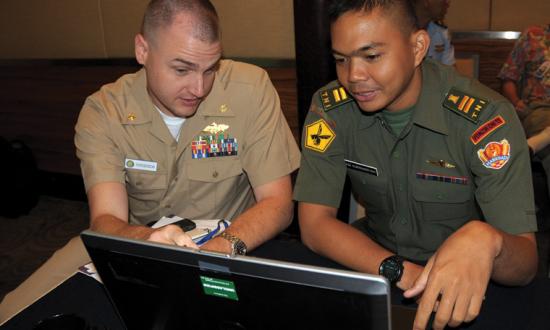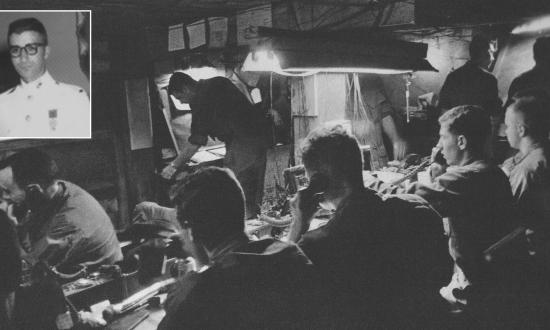Strategists speak the terse language of enabling objectives that lead to a desired end state. Military diversity policies should follow this same results-oriented logic and prioritize applications of diversity that directly support warfighting. While a nominally diverse force may reflect how well the military institution is functioning as an inclusive and trustworthy meritocracy or foster better civil-military relations by representing the nation as a whole with a force that looks like America, a functionally diverse force provides an asymmetric warfighting advantage over America’s competitors.
The Military Accessions Vital to National Interest (MAVNI) was a recruiting program that allowed legal aliens with vital skills to join the military, with the opportunity for expedited citizenship. With the resurgence of great power competition, the Sea Services need officer and enlisted candidates with globally diverse backgrounds and life experiences—a wider and deeper bench of language, regional, and cultural expertise. To leverage these uniquely American advantages, Congress should restore and expand MAVNI.
A Drive to Serve
Credit: Public Domain
Determined, intelligent, and highly qualified people from all over the world would gladly bear any burden to become U.S. citizens. These would-be immigrants have grit and a drive to serve, an enduring reality underscored by the disproportionate number of Congressional Medals of Honor awarded to immigrants—no less than 22 percent of the total.1
Charles A. MacGillivary was born in Canada and volunteered for the U.S. Army after the attack on Pearl Harbor. He became a U.S. citizen while in boot camp. He killed 36 entrenched German soldiers on a one-man patrol during the Battle of the Bulge before machine gun fire severed his left arm.2
Tibor Rubin, born in Hungary, survived 14 months in the Mauthausen concentration camp as a child before being liberated by the U.S. Army. His parents and little sister did not survive. He later recollected, “I made a promise that I would go to the United States and join the Army to express my thanks.” As noted in a staggering Congressional Medal of Honor citation that spans most of the Korean War, Rubin singlehandedly covered a regimental withdrawal, captured hundreds of North Korean soldiers, and kept dozens of his fellow Americans alive in a Chinese POW camp by “breaking into enemy food storehouses and gardens” and providing “desperately needed medical care and moral support for the sick and wounded.”3
The list goes on. The citations of 762 other foreign-born Congressional Medal of Honor recipients testify to the sacrifices so many immigrant service members have made for this truly diverse nation.4
The story of another refugee exemplifies the many other contributions immigrant service members have made to their adoptive nation.
Five years after fleeing ethnic persecution with his family, young Heinz became a naturalized U.S. citizen while going through boot camp. He spoke English with a thick accent and swore in with the anglicized name “Henry.”
In the same battle where Charles MacGillivary lost his arm, Henry used his native fluency in German to support combat intelligence. After the war, he used those same skills hunting Nazi war criminals. Henry later called his three-and-a-half years in uniform “a great Americanizing experience” where “nobody ever asked me about my accent.” He attended Harvard on the GI Bill and later reflected that, without it, he “might have become a partner in an accounting firm.”5
Thirty years after Heinz left Europe as a refugee, Henry Kissinger stepped into President Richard Nixon’s cabinet as National Security Advisor and, later, as Secretary of State under both Presidents Nixon and Gerald Ford. He brought with him the global perspectives and insights gleaned along that long journey.
Most immigrant service members will never serve in presidential cabinets or receive the Congressional Medal of Honor, but these extreme examples of service illustrate the functional diversity that immigrants can provide when granted the opportunity. The nation has long recognized this potential through legislation such as the Lodge-Philbin Act of 1950, the Hmong Veterans Naturalization Act of 2000, and through President George W. Bush’s July 2002 executive order, which further expedited citizenship for service members.
The Future of MAVNI
Authorized in 2008, the MAVNI pilot program built on that legacy and recruited approximately 5,000 legal permanent resident aliens annually, focusing on health-care professionals and those with special language and cultural backgrounds. Fifty strategic languages, from Albanian to Yoruba, were eligible under the program.6
When the program ground to a halt in 2017 under the Trump administration’s broader immigration policy changes, the Sea Services lost an important tool to recruit native speakers of languages vital to countering Chinese assertiveness (such as Burmese, Cambodian-Khmer, Hindi, Indonesian, Lao, Malay, Moro, Nepalese, Tagalog, Tamil, and Thai) and Russian aggression (such as Albanian, Azerbaijani, Bulgarian, Czech, Georgian, Hungarian, Polish, Serbo-Croatian, Turkish, Turkmen, and Ukrainian).7
Although the Defense Language Institute teaches these languages, adult language students must work for years to approach the fluency of a native speaker. That training pipeline cannot be surged or significantly accelerated: mastering a language takes time. Regaining the ability to recruit these language skills and globally diverse lived experiences would allow the Sea Services to shape the force and focus its capabilities on emerging theaters of potential conflict.
Friends Worth Saving
After the Paris Peace Accords and the end of the Vietnam War, thousands of ethnic Hmong in Vietnam and Laos faced communist retribution for their role in helping U.S. forces. More than 200,000 Hmong refugees would flee to the United States.8
Former interpreters in Iraq and Afghanistan now face the same lethal risks as the Hmong veterans did years ago. The Special Immigrant Visa (SIV) program for Iraqi and Afghan translators/interpreters recognizes their “faithful and valuable service” and aims to mitigate the “ongoing serious threat” to them and their families by granting expedited visas. But these visas have become tangled in bureaucratic red tape and tragically backlogged.19
Sakhidad Afghan had been waiting three years for his Special Immigrant Visa when the Taliban kidnapped, tortured, and killed him, posting photos of his mangled corpse on Facebook as a warning to his relatives.10 Granted a visa in reasonable time, Sakhidad could have brought profound gratitude and incredible diversity of experience to this nation. With legal immigration status in the United States, he could have joined the military that he worked with for so long and earned expedited citizenship. The nation would have been better for it.
In 2018, the U.S. government granted only two visas for Iraqi interpreters.11 Tens of thousands more in both Iraq and Afghanistan hoped their turn would come, even as they feared meeting the same end as Sakhidad. Among those waiting is Shaker Jeffrey, an ethnic Yazidi from northern Iraq who started working as an interpreter for U.S. forces at age 17. He applied to the SIV program a decade ago. He is still waiting.12
Former interpreters are ideal MAVNI candidates, particularly those who already have proven their courage in combat. Congress and the President should work together to clear the administrative backlog and put these worthy allies at the front of the immigration line.
Reagan and Lee
In his final speech as President, Ronald Reagan noted:
Thanks to each wave of new arrivals to this land of opportunity, we’re a nation forever young, forever bursting with energy and new ideas, and always on the cutting edge, always leading the world to the next frontier. This quality is vital to our future as a nation. If we ever closed the door to new Americans, our leadership in the world would soon be lost.13
Decades later, Lee Kuan Yew, founder of modern Singapore, elaborated on these quintessentially American strengths:
America’s strengths include an ability to range widely, imaginatively, and pragmatically; a diversity of centers of excellence that compete in inventing and embracing new ideas and new technologies; a society that attracts talent from around the world and assimilates them comfortably as Americans; and a language that [is] the lingua franca of those who rise to the top of their own societies around the world.14
U.S. asymmetry vis-à-vis China or Russia is much more than technological overmatch or a preponderance of forces. Competitors and potential enemies can never attract and assimilate the best, brightest, and most determined talent from around the world as America can. This is a source of profound diversity and an enduring strategic advantage, but one that needs better policy to meet its full potential. The Sea Services would do well to capitalize on this advantage and create a more functionally diverse force by restarting and increasing the scope of MAVNI.
1. Stuart Anderson, “Policy Brief: Military Contributions and Sacrifices of Immigrants,” National Foundation for American Policy, May 2020.
2. Statement of Mr. Charles MacGillivary before the U.S. Senate Subcommittee on Immigration, Senate Hearing 106-548: “The Contribution of Immigrants to America’s Armed Forces,” 106th Congress, 1st Session, 26 May 1999.
3. Beth Reece, “An American Hero,” U.S. Army, 16 February 2018.
4. Congressional Medal of Honor Society, “Statistics & FAQs: Do you have to be a U.S. citizen to receive the Medal of Honor?”
5. Jeff Stoffer, “If Not for the GI Bill,” American Legion Magazine, 19 May 2017.
6. Department of Defense, “Military Accessions Vital to National Interest (MANVI) Recruitment Pilot Program,” 21 January 2016.
7. Alex Horton, “U.S. Army Kills Contracts for Hundreds of Immigrant Recruits. Some Face Deportation,” Washington Post, 15 September 2017.
8. Jennifer Yau, “The Foreign-Born Hmong in the United States,” Migration Policy Institute, 1 January 2005.
9. Quil Lawrence, “Trump Administration Has Drastically Dropped Visas for Afghan And Iraqi Interpreters,” National Public Radio, 1 May 2019.
10. T. A Frail, “The Tragic Fate of the Afghan Interpreters the U.S. Left Behind,” Smithsonian Magazine, November 2016.
11. Dan De Luce, “Only 2 Iraqi Translators Who Worked with U.S. Troops got U.S. Visas Last Year,” NBC News, 23 August 2019.
12. Shaker Jeffrey, Shadow on the Mountain: A Yazidi Memoir of Terror, Resistance and Hope (Boston: Da Capo Press, 2020); and De Luce, “Only 2 Iraqi Translators.
13. Ronald Reagan, “Remarks at the Presentation Ceremony for the Presidential Medal of Freedom,” 19 January 1989, Ronald Reagan Presidential Library & Museum.
14. Graham Allison, Robert D. Blackwill, and Ali Wyne, Lee Kuan Yew: The Grand Master’s Insights on China, the United States, and the World (Cambridge, MA: MIT Press; Belfer Center Studies edition, 2013), 154. Also quoted at https://wcfia.harvard.edu/publications/singapores-lee-kuan-yew-talks-americas-strengths-and-weaknesses.









